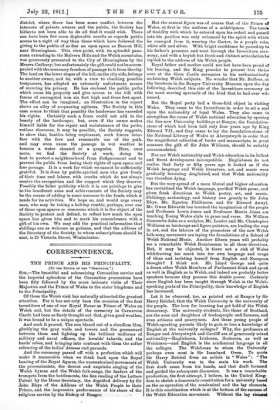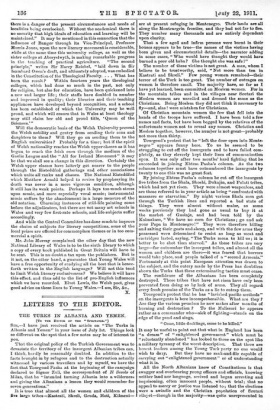CORRESPONDENCE.
THE PRINCE AND HIS PRINCIPALITY.
[TO THE EDITOR Or TIM "Srscraioic."] Sia,—The beautiful and solemnizing Coronation service and the imperial splendour of the Coronation processions have been fitly followed by the more intimate visits of Their Majesties and the Prince of Wales to the sister kingdoms and to the Principality.
Of these the Welsh visit has naturally attracted the greatest attention. For it has not only been the occasion of the first investiture of one of our Royal House as Prince of Wales on Welsh soil, but the details of the ceremony in Carnarvon Castle bad been so finely thought out that, given good weather, it was bound to be a unique spectacle.
And such it proved. The sun blazed out of a cloudless blue; glorifying the grey walls and towers and the greensward between them and lighting up the brilliant uniforms of military and naval officers, the heralds' tabards, and the bards' robes, and bringing into contrast with them the softer colouring of the ladies' dresses and parasols.
And the ceremony passed off with a perfection which will make it memorable when we think back upon the Royal bearing of the Royal figures, the unconstrained movements of the processionists, the devout and exquisite singing of the Welsh hymns and the Welsh folk-songs, the fanfare of the trumpets from the battlements, the fine reading of the Letters Patent by the Home Secretary, the dignified delivery by Sir j.ohn Rhys of the Address of the Welsh People to their Prince, and the impressive performance of his share of the
ieligions service by the-Bishop of Banger. - ' • But the central figure was of course that of the Prince of Wales, at first in the uniform of a midshipman. The touch of timidity with which he entered upon his ordeal and passed into his pavilion was only enhanced by the spirit with which be emerged from it, wearing the Garter, in a purple robe, white silk and silver. With bright confidence he passed up to his father's presence and went through the Investiture cere- mony, and with a boyish but frank and distinct articulation he replied to the address of his Welsh people.
Royal father and mother could not but have been proud of his bearing, and the King prouder to present him thrice over at the three Castle entrances to his enthusiastically acclaiming Welsh subjects. No wonder that Mr. Balfour, at the luncheon in the Bangor University Museum upon the day following, described this side of the Investiture ceremony as the most moving spectacle of the kind that he had ever wit- But the Royal party had a three-fold object in visiting Wales. They came to the Investiture in order to set a seal upon the nationality of loyal Wales. They also came to strengthen the cause of Welsh national education by opening the fine new University buildings at Bangor, the foundation- stone of which bad been laid only four years ago by King Edward VII., and they came to lay the foundation-stone of the National Library of Wales at Aberystwyth in order that the magnificent collection of books and manuscripts, in great measure the gift of Sir John Williams, should be suitably accommodated.
Nor are Welsh nationality and Welsh education in its fullest and finest development incompatible. Englishmen do not realize that forty or fifty years ago it looked as if the Welsh language and Welsh literature, art, and music were gradually becoming Anglicized, and that Welsh nationality was therefore dying.
But the very spread of a more liberal and higher education has revitalized the Welsh language, purified Welsh prose, and given fresh directions to Welsh poetry, art, and music. Philology, archwology, and history owe greatly to Sir John Rhys, Mr. Egerton Phillimore, and Sir Edward Anwyl. Mr. Owen Edwards has touched the imagination of the people and Professor Lewis Jones and Professor Morris Jones are teaching Young Wales style in prose and verse. Sir William Goscombe John as a sculptor, Mr. Leader and Mr. Christopher Williams as landscape and figure painters, are leading the way in art, and the labours of the promoters of the new Welsh folk-song movement are laying the foundations of a School of Welsh National Music. Another fifteen years will probably see a remarkable Welsh Renaissance in all these directions. But, it may be objected, is there not a risk of Wales withdrawing too much into her own language and range of ideas and isolating herself from English and European thought ? I think not. Mr. Lloyd George and quite a dozen other Welsh Members of Parliament think and speak as well in English as in Welsh, and indeed are probably better speakers because they possess this double power. Certainly since English has been taught through Welsh in the Welsh. speaking parts of the Principality, their knowledge of English has increased.
Let it be observed, too, as pointed out at Bangor by Sir Harry Reichel, that the Welsh University is the university of the people. The love for learning has got hold of the Welsh democracy. The university students, like those of Scotland, are the sons and daughters of tradespeople and farmers, and even artisans and quarrymen. Are these young people of Welsh-speaking parents likely to gain or lose a knowledge of English at the university colleges? Why, the professors at Bangor and Aberystwyth and Cardiff are of generously mixed nationality—Englishmen, Irishmen, Scotsmen, as well as Welshmen—and English is the academical language in all the colleges. The Welshman to whom the University perhaps owes most is Sir Isambard Owen. To quote Sir Harry Reichel from an article in " Wales ": "The Welsh University was in the main his work. The first draft came from his hands, and that draft focussed and guided the subsequent discussion. It was a remarkable production, the first attempt, I believe, in the United King- dom to sketch a democratic constitution for a university based on the co-operation of the academical and the lay elements. It is this combination whioh is at the bottom of the success of the Welsh Education movenient. Without the lay elenaeat
there is a danger of the present circumstances and needs of localities being overlooked. Without the academical there is no security that high ideals of education and learning will be maintained." It may be mentioned in this connection that the influence of Bangor through its Vice-Principal, Professor Morris Jones, upon the new literary movement is considerable, while at the same time this university college, as well as the sister college at Aberystwyth, is making remarkable progress in the teaching of practical agriculture. "The second principle," writes Sir Harry Reichel, "laid down in Sir Isambard Owen's draft, and ultimately adopted, was embodied in the Constitution of the Theological Faculty. . . . What has been the result ? Within fourteen years the theological colleges, which had done so much in the past, not only for religion, but also for education, have been quickened into a new and larger life ; their staffs have doubled in number and improved in quality ; their libraries and their teaching appliances have developed beyond recognition, and a school has been established of which the University may be well proud, and which will ensure that in Wales at least theology may still claim her old and proud title, 'Queen of the Sciences.'" Will the democratic basis of the Welsh University prevent the Welsh nobility and gentry from sending their sons and daughters to them ? Will they go on sending them to the English universities ? Probably for a time; but if the spirit of Welsh nationality reaches the Welsh upper classes as it has begun, to reach the Irish ones through the medium of the Gaelic League and the "All for Ireland Movement" it may be that we shall see a change in this direction. Certainly the Welsh upper classes have latterly got nearer to the people through the Eisteddfod gatherings and other associations which unite all ranks and classes. The National Eisteddfod which Matthew Arnold helped to revive by prophesying its death was never in a more vigorous condition, although it still has its weak points. Perhaps it lays too-much stress upon music, and more especially vocal music; instrumental music suffers by the abandonment in a large measure of the old notation. Charming instances of still-life painting come before the adjudicators, but there are not many art schools in Wales and very few first-rate schools, and life-subjects suffer accordingly.
And while the Central Committee has done much to improve the choice of subjects for literary competitions, some of the local prizes are offered for commonplace themes or in too com- mercial a spirit.
Mr. John Murray complained the other day that the new National Library of Wales is to be the sixth library to which a copy of every book published in Great Britain will have to be sent. This is no doubt a tax upon the publishers. But is it not, on the other band, a guarantee that Young Wales will have a free opportunity of studying all the best that is hence- forth written in the English language? Will not this tend to limit Welsh literary exclusiveness? We believe it will have this effect, and thus add to the list of pro-English influences which we have recorded. Elvet Lewis, the Welsh poet, gives good advice on these lines to Young Wales.—I am, Sir, &c., X.







































 Previous page
Previous page